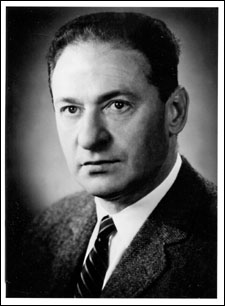Howard Frank, surgeon and inventor, dies
Howard A. Frank, co-developer of the heart pacemaker and clinical professor of surgery emeritus at Harvard Medical School, died from complications of a stroke at his Brookline, Mass., home on June 27. He was 89.

Frank was known internationally for his work on pioneering new surgical techniques and instruments, and locally for his dedication to patients. The late Harvard cardiologist Paul Zoll conceived the idea of and developed the first self-contained heart pacemaker with the help of Frank, who successfully implanted the small, battery-powered device in 1960. Earlier, in 1946, Frank and his colleagues at Boston’s Beth Israel Hospital developed the technique of abdominal irrigation, or dialysis, used ever since for treating kidney failure. Frank also worked with Beth Israel engineers to build a heart-lung machine before commercially made ones became available.
“Because of the critical nature of his patients’ illnesses, Howard purposely lived only minutes away from the hospital so he could get there quickly when needed,” noted Stafford Cohen, a cardiologist and professor of medicine at Harvard Medical School. Frank’s father, Louis J. Frank, had lived with his family, including Howard, in an apartment in the New York Beth Israel Hospital, of which he was the founding director.
Frank was born in New York City on Oct. 11, 1914. He graduated from Columbia University, where he was on the track team, in 1934. He then attended the New York University College of Medicine, earning a medical degree in 1937 at the age of 22.
From there, Frank went on to surgical training at Boston’s Beth Israel Hospital, a teaching and research affiliate of Harvard Medical School. He remained associated with both institutions during his 62 years of practice.
During his residency in 1939, Frank participated in research on synthetic vitamin K, which showed its effectiveness in treating blood-clotting disorders. In 1943, he initiated the use of venography, a technique for diagnosing inflammations in veins. During World War II, he served as a researcher in the U.S. Office of Scientific Research and Development.
A humble man dedicated to his patients, Frank saw them and did surgery until the age of 83 when he suffered a major stroke. “Even in his old age, doctors coming up in training would flock to him,” said Jacob Rachlin, a neurosurgeon at Beth Israel Deaconess Medical Center. “He was always available, the sweet grandfather.”
Frank is survived by his wife of 61 years, Sally Bernkopf Frank, three children and five grandchildren. The children include Anne F. Greene of Middletown, Conn., Edward D. Frank II of Villanova, Pa., and John B. Frank of Pasadena, Calif. He also leaves a brother, Charles W. Frank of Silver Springs, Md.




